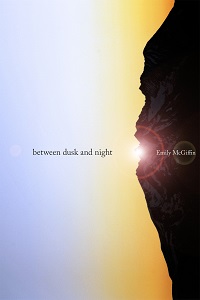This review also appears in Arc 72, The North. See our print issue for further reviews of great books, along with scintillating poetry, thought-provoking essays and more.
Emily McGiffin. Between Dusk and Night. London, Ontario: Brick Books, 2012.
~Reviewed by Rod Pederson
The cover of Emily McGiffin’s first collection is a horizon photo set vertically on the page: the world set on end. It’s an appropriate image for the personal journey the collection documents. The book deals with relationships between individuals and between humanity and Nature, insisting that connections are two-way, that we are interdependent within our shared ecosphere. Such a thesis will not arrive as news to anyone; however, as with all stories, its value is in the telling.
The opening poem, “Wokkpash,” places its speaker in the isolated Wokkpash Valley in north-eastern BC. She’s alone and uneasy with both present and past, uncomfortable “with that old wish / to have done better ….” Those feelings are echoed in nature itself: “it all could have / tried harder.” And
…. In the half-dark,
in this wolfish light, you are cold
awake with everything thoughtless,
everything without cause,
without reason. You crouch there
crepuscular,
animal,
alive.
The light here is animal and so is the speaker. They are joined in a way that surpasses simple projection: we don’t know which of the two, nature or human, projects upon the other. Suitably, the connection is thoughtless, acausal, apart from reason; it simply is.
It is natural to want to get away from the uneasiness of “Wokkpash.” But even as we move on to read “Setting Out,” the first poem in the next major section of the book, we are faced with the challenging and brutal realities of trying to make a clean break from the farm: “she will butcher / the last six chickens and drown the cat.” So ends one phase of life and begins another with startling determination. She sets off to find a better future in a $500 car, a shaky conveyance. Nonetheless, life does start to evolve into something more satisfying.
Along the journey, we are treated to some excellent writing. “As Air” is McGiffin at her laconic, plain-spoken best. “Insects in Lamplight After Rain” provides variety in the form of a compelling short story, in which the writer is humbled by the grace and generosity of the poor in Guinea, Africa. “Negative Space” inverts the way we might see an evening horizon (appropriate, considering the cover). And “Homesteading” returns us all to our collective memory of freshly baked bread, honey and delicious butter—the aromas of home. These poems shine.
“After a Journey” opens the final section, announcing a new life. The renewal is developed with skill and strength, concluding with the strongest work of the book, “Swadeshi,” a ten-part poem that stands in contrast with the loneliness and regrets of “Wokkpash.” “Swadeshi” opens, “And because words, if they were possible at all, / were illegitimate, tawdry, / I spoke to you in yarns.”
Lovely. She’s no longer on her own and has purpose, and a new person, in her life. Instead of butchering chickens and drowning cats, she shears sheep. And, of course, the ‘yarns’ aren’t simply spun wool—they’re the stories told Between Dusk and Night. These poems are an accounting of her life, an explanation of herself she gives to her partner, and to us. And we are happy to listen.
Rod Pederson is an Ottawa poet and event organizer. He was one of the founding members of VERSeFest, Ottawa’s international poetry festival and, until recently, was the Director of the Tree Reading Series.


